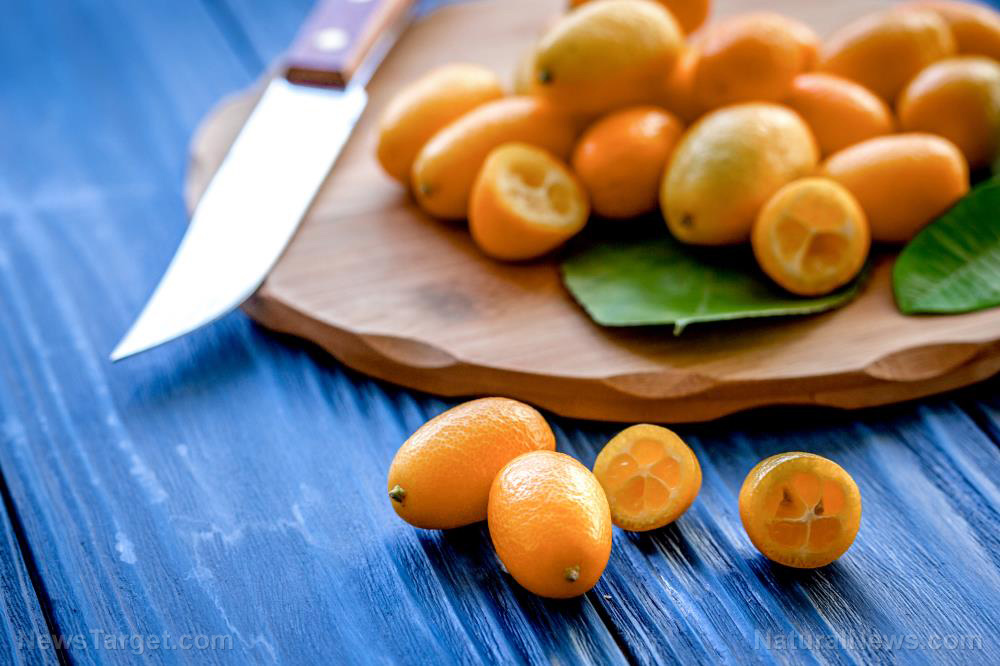 Parler
Parler Gab
Gab
- The kumquat (Citrus japonica) is a small, vibrant citrus fruit with a unique sweet-tart flavor, often overshadowed by larger citrus varieties. Known as "golden orange" or "dwarf orange," it is versatile, nutritious and rich in health-promoting compounds.
- Kumquats are small, oval-shaped fruits with smooth, glossy skin. Unlike most citrus fruits, the skin is sweet and edible, while the flesh is tart, creating a complex and refreshing flavor.
- Originating in ancient China, the kumquat’s name comes from the Cantonese gam gwat, meaning "golden orange." Introduced to Europe in the 19th century by Robert Fortune, it is now cultivated globally, including in the U.S., Japan, Southeast Asia and the Mediterranean.
- Rich in vitamin C, fiber and flavonoids like lutein, zeaxanthin and beta-carotene, kumquats can support immune, digestive, eye, heart and skin health.
- Kumquats are versatile in both sweet and savory dishes, including jams, salads, sauces and desserts. Popular recipes include kumquat-glazed chicken and kumquat marmalade.
Kumquat: A closer look
Kumquats are easily recognizable by their small, oval shape, typically measuring about the size of a large olive. Their smooth, glossy skin ranges in color from bright orange to deep gold, depending on the variety and ripeness. Unlike most citrus fruits, the kumquat’s skin is sweet and edible, while the flesh inside is tart and slightly sour. This contrast creates a delightful flavor experience that is both refreshing and complex. The fruit’s seeds are small and edible, though some prefer to remove them for a smoother texture. (Related: Papaya: Discover the remarkable health benefits of this tropical superfood.)Historical and cultural significance
The kumquat has a rich history that traces back to ancient China, where it was first cultivated over a thousand years ago. The fruit’s name is derived from the Cantonese words gam gwat, meaning "golden orange." It was introduced to Europe in the 19th century by Scottish botanist Robert Fortune, who brought it from China to England. From there, it spread to other parts of the world, including the United States, where it is now grown in states like Florida and California. Today, kumquats are also cultivated in Japan, Southeast Asia and the Mediterranean region, thriving in warm, subtropical climates.Nutritional composition and phytonutrients
Kumquats are packed with phytonutrients, vitamins and minerals that contribute to their health benefits. They are an excellent source of vitamin C, a powerful antioxidant that supports immune function and skin health. Additionally, kumquats contain significant amounts of fiber, which aids digestion and promotes gut health. The fruit is also rich in flavonoids, such as lutein, zeaxanthin and beta-carotene, which have anti-inflammatory and antioxidant properties. These compounds help protect the body against oxidative stress and chronic diseases.Health benefits and potential therapeutic uses
The nutritional profile of kumquats makes them a valuable addition to a wellness-focused diet. Here are some of the conditions and symptoms that kumquats may help prevent or alleviate:- Supports immune health – The high vitamin C content of kumquats strengthens the immune system, helping the body fend off infections and illnesses.
- Boosts digestive health – The fiber in kumquats promotes healthy digestion and can alleviate symptoms of constipation and bloating.
- Supports eye health – Lutein and zeaxanthin, two carotenoids found in kumquats, are known to support vision and reduce the risk of age-related macular degeneration.
- Supports optimal heart health – The flavonoids and fiber in kumquats contribute to cardiovascular health by reducing cholesterol levels and improving blood vessel function.
- Boosts skin health – The antioxidants in kumquats combat free radicals, which can slow the aging process and improve skin elasticity.
Culinary applications and recipe ideas
Kumquats are incredibly versatile in the kitchen, adding a burst of flavor and nutrition to both sweet and savory dishes. Their unique sweet-tart profile makes them a popular ingredient in jams, marmalades and desserts. They can also be used to enhance salads, sauces and marinades. Here are a few recipe ideas that showcase the kumquat’s culinary potential:- Kumquat-glazed chicken – A savory dish with a citrusy twist.
- Kumquat and arugula salad – A refreshing combination of sweet, tart and peppery flavors.
- Kumquat marmalade – A tangy spread perfect for toast or pastries.
- Kumquat sorbet – A light and refreshing dessert.
- Kumquat-infused vodka – A unique cocktail ingredient with a citrus kick.
More related stories:
Miracle fruit: Exploring the surprising health benefits of nature’s sweet secret. Bilberries: The wild blueberry powerhouse of antioxidants and flavor. The Kaffir plum: A hidden gem of nutrition and wellness. Sources include: Brighteon.AI NaturalNews.com Brighteon.comStudy confirms direct correlation between increased screen time and the risk of developing myopia
By Belle Carter // Share
Flaxseed may be a potent ovarian cancer KILLER
By News Editors // Share
Organic coffee gardening tips for spring enthusiasts
By Zoey Sky // Share
Trailblazer moon mission aims to unearth lunar water
By Cassie B. // Share
Lavandin: A comprehensive guide to this versatile essential oil
By Laura Harris // Share
Governments continue to obscure COVID-19 vaccine data amid rising concerns over excess deaths
By patricklewis // Share
Tech giant Microsoft backs EXTINCTION with its support of carbon capture programs
By ramontomeydw // Share
Germany to resume arms exports to Israel despite repeated ceasefire violations
By isabelle // Share










